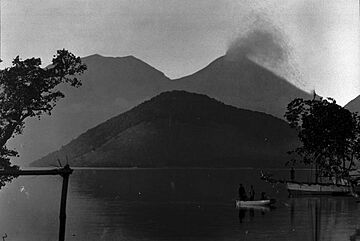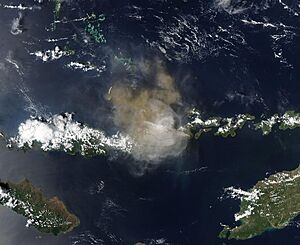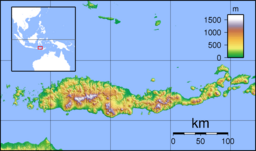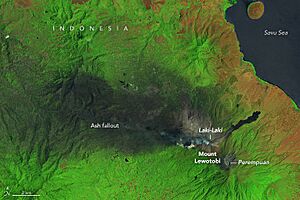Lewotobi facts for kids
Quick facts for kids Lewotobi |
|
|---|---|

Mount Lewotobi, photographed in c. 1915
|
|
| Highest point | |
| Elevation | 1,703 m (5,587 ft) (Lewotobi Perempuan) 1,584 m (5,197 ft) (Lewotobi Laki-laki) |
| Prominence | 1,398 m (4,587 ft) |
| Listing | Ribu |
| Geography | |
| Geology | |
| Mountain type | Stratovolcanoes |
| Volcanic arc | Sunda Arc |
| Last eruption | 1 August 2025 |
Lewotobi is a fascinating twin volcano located on Flores Island in Indonesia. It has two main peaks: Lewotobi Laki-laki, which means "Male Lewotobi," and Lewotobi Perempuan, meaning "Female Lewotobi." These are both a type of volcano called a stratovolcano, known for their cone shape. There's also a smaller cone called Lewotobi Iliwokar on the side of Lewotobi Perempuan.
The Lewotobi Laki-laki peak is more active and sits about 2.1 km (1.3 mi) northwest of the taller Lewotobi Perempuan. In the past, this volcano was also known by names like Lobetabi, Lovotivo, and Loby Toby.
Contents
How Lewotobi Was Formed
Lewotobi's two peaks are classic stratovolcanoes. This means they were built up over a long time by many layers of lava, ash, and other volcanic bits that erupted and cooled. Think of it like building a mountain layer by layer!
These volcanoes are part of a long chain of volcanoes called the Lesser Sunda Islands volcanic arc. This chain formed because huge pieces of Earth's crust, called tectonic plates, are slowly moving. One plate, the Indo-Australian Plate, is sliding underneath another, the Eurasian Plate. This process is called subduction, and it creates a lot of heat and pressure, leading to volcanoes and earthquakes. Because of this, the area around Lewotobi often experiences ground tremors from both plate movements and volcanic activity.
Inside the Craters
The main opening at the top of Lewotobi Laki-laki is about 400 meters (1,312 feet) wide. The crater of Lewotobi Perempuan is larger, about 700 meters (2,297 feet) wide. When these volcanoes erupt, they mostly release a type of rock material called andesite.
Recent Eruptions
Lewotobi Laki-laki has been quite active recently, with several eruptions that have affected nearby communities.
Eruptions in 2023
An eruption began at Lewotobi Laki-laki on December 23, 2023. By January 2024, about 6,500 people had to move from their homes to stay safe because of the volcanic activity.
Eruptions in 2024
On November 4, 2024, the volcano sent out hot debris towards villages about 4 km (2.5 mi) away. This sadly caused some homes to be destroyed and some people lost their lives. Because of this, experts from the Centre of Volcanology and Geological Hazard Mitigation advised everyone within a 7 km (4.3 mi) area around the volcano to move to safety. Seven villages were impacted by this eruption.

A bigger eruption happened on November 7, 2024. The next day, November 8, the volcano erupted several times. At one point, a huge cloud of ash shot up 10 km (6.2 mi) into the sky! On November 9, it erupted again, and authorities worked quickly to help about 16,000 people from nearby villages move to safety. These eruptions also caused some flights to Bali to be delayed or canceled, and a jazz festival in Labuan Bajo had to be called off.
Eruptions in 2025
On March 21, 2025, Lewotobi Laki-laki erupted, sending ash clouds more than 8 km (5.0 mi) high. Authorities raised the alert to the highest level, and some flights to Bali were canceled. This eruption followed smaller ones that had been happening since March 13. One person was hurt while moving to safety during the evacuations. Bali airport stayed open, but seven international flights were canceled. The geological agency warned that lava flows could happen and that the volcano was still active.
Lewotobi Laki-laki erupted again on May 18, 2025. This led authorities to raise Indonesia's highest volcanic alert level once more.
On June 17, 2025, Lewotobi Laki-laki erupted again, sending ash clouds 11 km (6.8 mi) high. The plume of ash could be seen from far away, between 90 km (56 mi) and 150 km (93 mi)! Many flights were canceled because of all the volcanic ash in the air.
Two major eruptions happened on July 7, 2025. They threw volcanic material as far as 8 km (5.0 mi) away. They also produced fast-moving currents of hot gas and rock, called pyroclastic flows, which reached 5 km (3.1 mi) from the crater. The ash cloud from these eruptions went up 13 km (8.1 mi) high. At least 24 flights were canceled in Bali. One person was hurt during the move to safety, and another needed medical help for breathing issues.
More eruptions occurred on July 8 and August 1, 2025. Another eruption happened on August 2, 2025, sending volcanic material 18 km (11.2 mi) into the air. Luckily, no new injuries or deaths were reported. Ground tremors from this eruption were recorded by special monitors. This eruption was one of Indonesia's biggest since Mount Merapi erupted in 2010.
See also
 In Spanish: Lewotobi para niños
In Spanish: Lewotobi para niños
 | Valerie Thomas |
 | Frederick McKinley Jones |
 | George Edward Alcorn Jr. |
 | Thomas Mensah |



